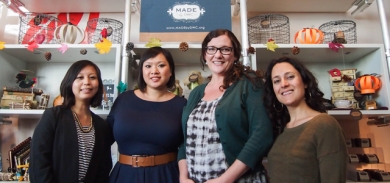
Before Los Angeles Times columnist Steve Lopez catapulted Nathaniel Ayers into the public eye and before film crews descended on the streets of downtown LA to film “The Soloist,” there were UCLA Social Welfare students on Skid Row.
For the past 20 years, first year Social Welfare master’s students have visited Los Angeles’ infamous Skid Row – the 50-block area in downtown Los Angeles that contains the highest concentration of homelessness in America – as part of their field education.
The goal for the Skid Row module, which was created in 1994 by field faculty member Mary Brent Wehrli, is to expose students to the needs of the homeless population and teach them the role of social workers in the community. Back then former field education director Joseph Nunn called it “one of the most meaningful learning experiences offered” to first-year students. Now in its twentieth year, its legacy continues to be significant.
“Mary Brent had the foresight to do this before Skid Row received any attention from the general public and policy makers,” said Toby Hur, UCLA field faculty member who picked up the torch after Wehrli’s retirement in 2004. “Twenty years ago, pre-media coverage, it wasn’t a place people went.” After Wehrli started taking students to Skid Row, many of them never left.
In 1999, when Wehrli was named California’s Social Welfare Practitioner of the Year, a UCLA news story credited the module – which consists of an orientation at the Society of St. Vincent de Paul’s Cardinal Manning Center (which has hosted the module since its inception), a walk through Skid Row, and visits to several agencies – for putting UCLA students in the Skid Row community. “As a direct result of Wehrli’s efforts, two department alumni now work at Skid Row agencies and four to six master’s students intern there each year,” the story read.
Today, Hur said the unique immersion experience continues to launch the careers of many UCLA alumni and embed them in a community with a lot of needs.

Shannon Murray talks with Case Manager Jeremiah Curry at the Watts Labor Community Action Committee.
Shannon Murray (MSW ’96), program director of Homeless and Housing Services at the Watts Labor Community Action Committee, was in the first class to participate in the Skid Row module. Although she’d never worked with the homeless population before the tour, Murray remembers telling a friend that she’d be open to doing her placement there.
“It was the sense of community,” Murray said when asked what she experienced on the tour that drew her to Skid Row. “There’s a lot of heart and spirit there and I had a sense that this is where social work should be.”
Murray ended up doing her first year placement at the Cardinal Manning Center. That summer, she, along with Wehrli and Joan Sotiros, the director of Cardinal Manning at the time, started a lunchtime seminar series for interns and new staff in the area to help them understand the unique needs and the organizations that affect the Skid Row community. The program is now in its 18th year, with the Cardinal Manning Center in consultation with the Social Welfare department coordinating the series presentations and gathering all area interns.
After graduation, Murray returned to Cardinal Manning and spent six years there before moving to other Skid Row agencies, including LAMP Community. She also helped conduct the Skid Row tours for UCLA students for 15 years.
“We were actually able to start changing the face of social work on Skid Row,” Murray said. “There’s a lot of social work that happens there, but in the form of volunteerism and charity. We started bringing in the professionalism of social work, and began developing programs and policy on a macro level.”
Although she no longer works with the Skid Row population, Murray is still invested in solving the issue of homelessness from her office in Watts. She credits Wehrli for introducing her to the idea of social justice work that looks at the bigger picture.

Jenn Ma-Pham in her office at the Downtown Women’s Center.
Like Murray, Jenn Ma-Pham (MSW ’07) had never worked with the homeless population before she took the Skid Row module in 2005 and completed her first year placement at the Cardinal Manning Center. She was drawn to the area because of its clear sense of community and the strength and resilience amongst the community members.
After a few years working in legislation pertaining to homelessness and as a program developer for women who experience severe mental illness and have been incarcerated, Ma-Pham returned to Skid Row as Director of Housing and Clinical Health Services at the Downtown Women’s Center. Together with three other UCLA Social Welfare alumna (Stephanie Chen MSW/MPH ’13; Sarah Mitchell MSW ’08; and Penelope Oberhardt MSW ’08), Ma-Pham oversees the program that serves over 4,000 women a year.
Ma-Pham agrees that there is much more collaboration between agencies than there has ever been, and agencies are working more closely with the city, county and federal goverment. There are also efforts to connect people to housing faster and to work together to find community solutions.
The Skid Row module now includes a stop at the Downtown Women’s Center where Ma-Pham gets to speak to new students. She said she hopes students will learn to find what they’re passionate about and to make the most of their field work.
“When I think about what has made the alums that work here successful, it’s that they work very hard and very passionately,” she said. “It’s important for a social worker to find his or her passion and then be relentless about it. In addition to academics, a lot of social work is about experience. Don’t lose sight of what you’re supposed to learn in the field. This is where you’re going to learn the skills that are going to take you far.”

Njambi Kingori gives a brief tour of the Cardinal Manning Center transitional shelter for men on Skid Row.
For Njambi Kingori (MSW ’09), deputy director of Social Services at the Society of St. Vincent de Paul, the Skid Row module was an eye opening experience. A native of Kenya, she had only been living in the United States for a short time before enrolling at UCLA, so she was not familiar with Los Angeles.
“I had seen poverty before in Kenya and other countries, but seeing this kind of community setting in the U.S., a country that provides financial aid to other countries, was shocking,” Kingori said. “Walking through the streets and hearing people’s stories and what the agencies do was a big learning curve for me in recognizing the disparity between the different parts of the city and the need for finding solutions to end homelessness.”
Prior to her graduate studies, Kingori had worked for a non-profit in Kenya doing international refugee resettlement for people displaced by civil wars and were homeless as a result.
When she started her first year placement at Cardinal Manning Center, she was eager to learn the causes of homelessness in Los Angeles and develop new tools for social work in a new environment. She had chosen to come to UCLA for her degree because of its reputation. Through her research of schools, she met with alumni who told her that the field education faculty provided students with a lot of support and opportunities during placement. For Kingori, that was the key.
Advice for Students
Alumni working on Skid Row have the following advice for students:Shannon Murray
“Try to put aside your preconceived notions and be open to the experience. Be aware and be open. Be careful what you’re getting into, because it can be addicting! The clients we work with every day make it worth it. Celebrate and embrace the small victories. Patience is a virtue.”Njambi Kingori
“Avoid judging your clients’ circumstance and thought process – it helps with relationship building and understanding the client from where they are at. Be patient and very respectful. Be open to learning opportunities provided by your school and placement agencies. Share your ideas – this is a field where innovative and creative ideas will bring viable and lasting solutions to social problems.”Jenn Ma-Pham
“Be flexible. Learn to navigate the process and be patient with it. I think students should really figure out what their passions are. This is your time to experiment, to find what drives you and find out what you’re good at. The only way you do that is to mess up, so I really encourage you to make mistakes so you can learn from them.”
View videos from the Department of Social Welfare on working with homelessness. |
“I enjoyed my first year placement so much that after it was over I told Joan Sotiros that I wanted to come back and work for her,” Kingori said. “Joan told me that if they had an opening, and I was still interested in working with them after my studies, then I would have a place.”
This is now Kingori’s fifth year at Cardinal Manning Center since graduation (she held roles as a social worker, program coordinator and now deputy director), and each year she participates in orientations and debriefings for new students doing the Skid Row module.
Kingori sees a lot of progress on Skid Row as the conversation has turned toward permanent supportive housing and services for the homeless. There is more collaboration between agencies and the amount of information about Skid Row has increased immensely, she said.
“When I started my internship as a first year student, if you Googled the word ‘Skid Row,’ I think you would get less than 20 hits and most of them were about a rock band,” Kingori said.“Now there is tons of information.”
Still, there is a lot of work to be done to find affordable and supportive housing for the homeless. Kingori said she often tells students on the tour that she is not certain whether homelessness will end in her lifetime due to its sociopolitical and economic complexities. But the incremental progress that is being made each year keeps her optimistic that there is a solution.
“If I can help in shaping policy on homelessness or getting clients to appropriate housing, I’ve played my small part,” she said.

This fall, the UCLA Luskin School of Public Affairs is highlighting the myriad ways students, faculty, staff and alumni are working to build a better world — one person, one project, one place at a time. This week the School kicks off its “Season of Service” with the first Luskin Lecture of the year hosted in partnership with Volunteers of America.
The Luskin Lecture features a screening of the documentary film American Winter about middle class families falling into poverty and their search for help. The film has proven to be a tool in helping to shift dialogue and perceptions about poverty, as it challenges stereotypes about who turns to the social safety net for help and why. Following the screening will be a discussion with film director Joe Gantz, housing advocate Orlando Ward, and Social Welfare professor Laura Abrams on how to close the holes in the safety net and bring millions of Americans in from the cold. RSVP here.
Additional upcoming Season of Service events:
Tuesday, Oct. 28:
Tuesday, Nov. 4:
- A discussion on Coordinated Entry Systems will be held at 5:30pm in the Public Affairs Building.
A highlight of the Season of Service is on Saturday, Nov. 15 when the Luskin School participates in the 2014 United Way Homewalk at Exposition Park – walking and running to end homelessness.
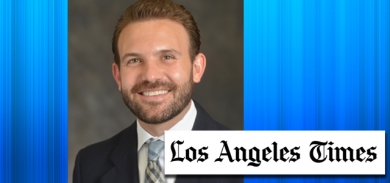

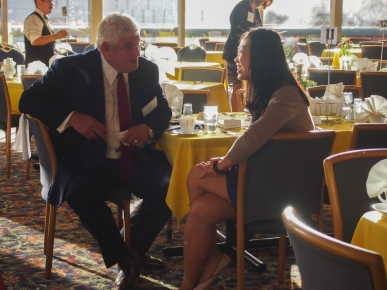
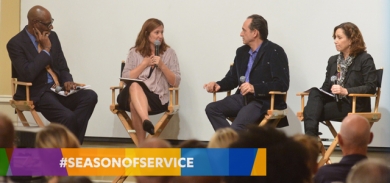





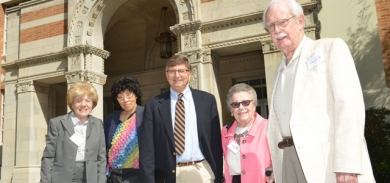


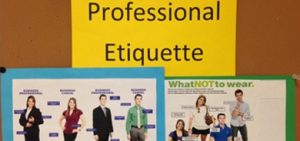
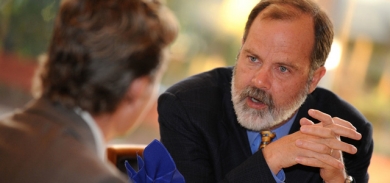 Veteran journalist and author
Veteran journalist and author 
